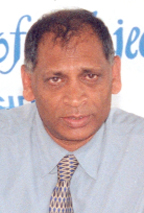-says some private operators charging as much as $20,000 for a unit
Health Minister Dr Leslie Ramsammy says the health sector has a growing demand for blood despite the success of the voluntary blood donation programme, and he was also critical of some hospitals in the private sector which are reportedly profiting from the donations.

In the public sector a battery of tests are done on blood donations to ensure safety and the private operators are asked to pay a fraction of the cost of testing, but the minister emphasized that the provision of blood in the private sector should not be part of the profit making services that the sector provides. “It is my view and I am saying this without any kind of vagueness…the private institutions have used the need for blood as a profit-making service”, he noted at a press conference on Wednesday.
Ramsammy said reports have reached him that some private operators are charging as much as $20,000 for a unit of blood. He decried this practice saying people donate blood freely as part of a national service without any compensation.
Currently, the average demand from hospitals has increased to around 900 units of blood a month while the health sector is averaging between 600-800 units monthly. According to Ramsammy the demand is now higher because more surgeries are being done in both the public and private sectors.
Regular blood donors donate once a year and the sector needs people to donate about three times a year based on the demands. “We do not want services to be limited due to the availability of blood”, Ramsammy said. He appealed to the citizenry to come forward and donate blood because the sector is falling behind.
Countrywide the health sector had embarked on a campaign to achieve one hundred percent voluntary blood donations. The drive was targeting between 8,000-10,000 units of blood for the year but that supply is now deemed inadequate based on the growing monthly demands across the health sector. This, according to the minister is where the problem lies.
He said the need has increased tremendously for blood, but despite this need he said no one should be forced to pay exorbitant prices for blood. He said too that anyone who has to receive blood should ask questions as to where the blood came from because every unit donated faces a rigorous screening process within the sector.
Though the majority of donations are through voluntary donations around 25 percent is accumulated through family replacements. Ramsammy noted that families still donate blood when a relative undergoes a surgery, but he insisted that the sector makes no demands on families to do this. He noted that they hope to someday phase out family replacements. Ramsammy said that family replacements though not contentious also have their challenges because people sometimes demand to know where every unit is going.

